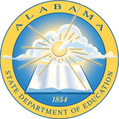National board for professional teaching standards
The University of Alabama/University of West Alabama Regional In-Service Center is committed to assisting teachers in its region who are applicants to the National Board for Professional Teaching Standards (NBPTS). Each year, our Center offers applicants an opportunity to participate in a professional learning group with other teachers also seeking national board certification.Members of the NBPTS professional learning group meet throughout the academic year on contracted school days with a mentor/facilitator who has already achieved NBPTS status. For more information and for eligibility criteria to join the professional learning group, please contact Terri Boman, Interim Director of the UA/UWA In-Service Center.
Background Information:
National Board for Professional Teaching Standards
(Website: www.nbpts.org)
The National Board for Professional Teaching Standards (NBPTS) was created in 1987 after the Carnegie Forum on Education and the Economy’s Task Force on Teaching as a Profession releasedA Nation Prepared: Teachers for the 21st Century. Shortly after its release, NBPTS issued its first policy statement: What Teachers Should Know and Be Able to Do.
This policy set forth our vision for accomplished teaching. The Five Core Propositions form the foundation and frame the rich amalgam of knowledge, skills, dispositions and beliefs that characterize National Board Certified Teachers (NBCTs).
Since 1987 more than 55,000 teachers have achieved National Board Certification. That’s 55,000 teachers working side-by-side with administrators and fellow colleagues, tackling the challenges in today’s classrooms.
Proposition 1: Teachers are Committed to Students and Learning
Proposition 2: Teachers Know the Subjects They Teach and How to Teach Those Subjects to Students.
Proposition 3: Teachers are Responsible for Managing and Monitoring Student Learning.
Proposition 4: Teachers Think Systematically about Their Practice and Learn from Experience.
Proposition 5: Teachers are Members of Learning Communities.
Background Information:
National Board for Professional Teaching Standards
(Website: www.nbpts.org)
The National Board for Professional Teaching Standards (NBPTS) was created in 1987 after the Carnegie Forum on Education and the Economy’s Task Force on Teaching as a Profession releasedA Nation Prepared: Teachers for the 21st Century. Shortly after its release, NBPTS issued its first policy statement: What Teachers Should Know and Be Able to Do.
This policy set forth our vision for accomplished teaching. The Five Core Propositions form the foundation and frame the rich amalgam of knowledge, skills, dispositions and beliefs that characterize National Board Certified Teachers (NBCTs).
Since 1987 more than 55,000 teachers have achieved National Board Certification. That’s 55,000 teachers working side-by-side with administrators and fellow colleagues, tackling the challenges in today’s classrooms.
Proposition 1: Teachers are Committed to Students and Learning
- NBCTs are dedicated to making knowledge accessible to all students. They believe all students can learn.
- They treat students equitably. They recognize the individual differences that distinguish their students from one another and they take account for these differences in their practice.
- NBCTs understand how students develop and learn.
- They respect the cultural and family differences students bring to their classroom.
- They are concerned with their students’ self-concept, their motivation and the effects of learning on peer relationships.
- NBCTs are also concerned with the development of character and civic responsibility.
Proposition 2: Teachers Know the Subjects They Teach and How to Teach Those Subjects to Students.
- NBCTs have mastery over the subject(s) they teach. They have a deep understanding of the history, structure and real-world applications of the subject.
- They have skill and experience in teaching it, and they are very familiar with the skills gaps and preconceptions students may bring to the subject.
- They are able to use diverse instructional strategies to teach for understanding.
Proposition 3: Teachers are Responsible for Managing and Monitoring Student Learning.
- NBCTs deliver effective instruction. They move fluently through a range of instructional techniques, keeping students motivated, engaged and focused.
- They know how to engage students to ensure a disciplined learning environment, and how to organize instruction to meet instructional goals.
- NBCTs know how to assess the progress of individual students as well as the class as a whole.
- They use multiple methods for measuring student growth and understanding, and they can clearly explain student performance to parents.
Proposition 4: Teachers Think Systematically about Their Practice and Learn from Experience.
- NBCTs model what it means to be an educated person – they read, they question, they create and they are willing to try new things.
- They are familiar with learning theories and instructional strategies and stay abreast of current issues in American education.
- They critically examine their practice on a regular basis to deepen knowledge, expand their repertoire of skills, and incorporate new findings into their practice.
Proposition 5: Teachers are Members of Learning Communities.
- NBCTs collaborate with others to improve student learning.
- They are leaders and actively know how to seek and build partnerships with community groups and businesses.
- They work with other professionals on instructional policy, curriculum development and staff development.
- They can evaluate school progress and the allocation of resources in order to meet state and local education objectives.
- They know how to work collaboratively with parents to engage them productively in the work of the school.


